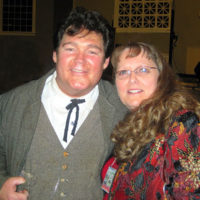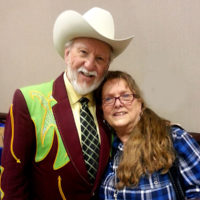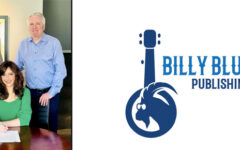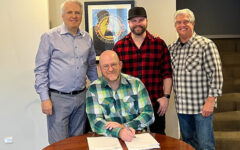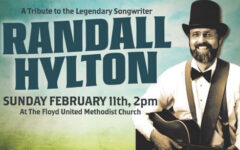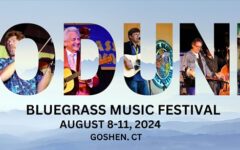
Paula Breedlove is a rarity in the song-writing fraternity in that she doesn’t play a musical instrument.
So, she worked hard at perfecting her lyrics. She studied the works of Nashville’s country music song-writers, and began studying the Country music charts, keeping track of which songwriters used co-writers, and mailing her lyrics to music publishing companies in Nashville. The first of her songs to be recorded, More Nights, was co-written with the award-winning Nashville songwriter Bob Morrison, and was used on the soundtrack of the 1983 Dennis Quaid film, Tough Enough.
Arguably her greatest accomplishment has been the 10-song collaboration with Mark ‘Brink’ Brinkman and Mike Evans, the bulk of the 13 songs on Rural Rhythm Records’ God Didn’t Choose Sides: Civil War True Stories about Real People. These 10 songs include the title track, which relates the brief laying down of arms as soldiers of the Blue and the Grey, each occupying a different bank of the Rapidan River, as they witness the baptism of a Confederate soldier.
What musical interests, if any, did your family have prior to and around the time that you were born?
“Most people who are in the music business are born into families who were also musicians or singers, but that is not the case with me. I am the first to take the musical road through life. Born into the 1950s, although my parents didn’t play any instruments, they loved all kinds of music. I remember that their favorite song was Indian Love Call by Slim Whitman, and it remained their favorite for their entire life. They actually met at the historic Zoar Hotel Ballroom where people still did the polka and waltz. I still love a waltz today because I grew up dancing to those wonderful 3/4 time songs with my father. My parents were also great polka dancers and taught me how to do it well at an early age. I don’t think we ever missed an episode of The Lawrence Welk Show with his famous bubbles.
As a little girl, I was also introduced to all kinds of music while taking tap and ballet lessons, but I believe they always wanted a musician in the family because they kept an old piano in the dining room that I think belonged to my Grandmother. I don’t remember anyone else ever being able to play that piano, but they had it tuned up and had me take lessons on it from Mrs. Tschantz who lived just up the road.”
So, you were taught to dance and play the piano; did anybody teach you how to sing?
“The short answer to that question would be “No.” My first experience in singing, however, was at a children’s Christmas party at our church. In order to get a Christmas Gift, each child had to perform in some way for Santa. I chose to sing He’s Got The Whole World In His Hands, and I was a big hit. After that, I was asked on a regular basis to sing in church, but singing those hymns was a whole lot different than singing He’s Got The Whole World in his Hands, which requires a voice range that almost anyone can reach. In those days, the church piano player never thought about changing the key of a song out of a hymn book to better suit a singer with an alto voice like mine. After that I settled for singing alto in the school choir.
In spite of my singing limitations, I still loved music and wanted to be a part of it, which is why being a songwriter was such a perfect choice for me.”
What was the next phase in your musical development?
“When looking for just about any type music I could enjoy at home, I would listen to that little black FM radio we had in our house. I don’t remember that radio not being there. Then, for a birthday present, I got a little 45 [rpm] record player and joined a record club. The first record I ever purchased was Blueberry Hill, and I also remember purchasing a 45 [rpm] record of Tom Dooley. I still have all those old 45s in my closet somewhere.
As a teenager, like everyone else I knew, I listened to pop music and loved anything they played that we could dance to at the High School Sock Hops. I am sorry that the kids today are missing out on the fun of those sock hops after the ball games. I also remember coming home from school, watching American Bandstand, and doing the jitter bug with my mother.
When the variety shows, which are still the best things that have ever been on TV, became popular I watched and loved them all. The Glen Campbell Show was my favorite. Country music was also in my blood, and after I was married, we would go to every country music concert that was in driving distance. My favorite female country singer was and still is Dolly Parton. My favorite male country singer is John Denver, and I was also influenced by Ronnie Milsap, Don Williams, Eddie Rabbitt, and the list could go on. I began to study the songs and especially the lyrics, and subscribed to Country Song Roundup magazine where I could not only study the lyrics but read about the top songwriters. That is when I started putting my own ideas and lyrics to paper with an old antique Royal typewriter. And so, it began.”
What were the stages from leaving high school to getting a song recorded?
“Between graduating from High School and getting my first song recorded, I got married and had two children. My husband, John, had similar musical interests, and when I began to write, he was very supportive, and did a lot of the song plugging for me. His family was originally from North Carolina and my mother-in-law Fannie Lee became a big influence on my musical preferences of bluegrass, country and Southern Gospel. Fannie Lee also became one of my biggest fans.
When my kids were old enough, we would make trips to Nashville, and have them with us when we were visiting publishing companies on Music Row. Everyone thought they were such well behaved kids because they were so good when we were in the offices, but when we got back to the hotel room, it was a different story. One of the first Music Row writers to work with me on a song was award-winning songwriter Bob Morrison, who was a staff writer for Combine Music. Our first song, More Nights, took a long time to get finished because we did it all via snail mail or an occasional phone call. It was recorded in 1983 by Lane Brody for the Movie Soundtrack of Tough Enough staring Dennis Quaid. At that time, I was also fortunate to write with award winning songwriters Johnny MacRae, Archie Jordan, and Wayland Holyfield.”
So, in recent years you have been able to exchange E-mails and use other electronic means to get a song written, as with your regular co-writer Brad Davis ….
“When Internet access finally came to my house, co-writing became so much easier. I could send a lyric to a co-writer and receive a rough recording of the melody back. I could also send a finished demo to an artist via the Internet, and never have to spend hours making cassette tapes to send via snail mail. I do still occasionally make CDs with songs to give someone, but even those are slowly becoming a thing of the past. A lot of writers still like to be with someone face to face to co-write, but I have become very accustomed to long distance writing, and have a select group of co-writers that have worked well with me that way. That would include Brad Davis, Mark Brinkman, Bob Morrison, Archie Jordan and Gerald Crabb. That way of co-writing gives me time to really ponder the song idea before sending back re-writes.
I always keep a pencil and paper beside my bed so, I can write down any ideas I have in the middle of the night, because by morning I usually forget what they were.”
Just when Breedlove was beginning to make progress with her songs, with recordings by Lane Brody, Terri Gibbs, and Marie Osmond, the dreaded disease cancer hit her multiple times. In 1990 her mother was diagnosed with breast cancer, and in the following year came her own diagnosis. After her mother passed away in 1993 Breedlove became the carer for her father until he passed in 1994. Then in 2000, her daughter became the fourth generation in a row to have breast cancer.
Dealing with all this meant that her songwriting was, understandably, neglected for several years.
However, eventually, she did resume her passion. Paula doesn’t remember the exact year, but she recalls that it was at a time when her son returned home from Belmont University where he was majoring in music. It was when he was playing his guitar and bringing music back into the house that she was inspired to start writing seriously once more.
“My husband said he would support me by handling the business end of things so I could focus on the creative part. I learned that my best way to overcome the hardships in my life was to go back to writing again, and I haven’t quit since then.”
Health problems recurred, setting Breedlove back a bit during the last few years, however bluegrass music provided her saving grace …
“Actually, song-writing is what helped me get through all the pain and hard times. Last time I was in the hospital after surgery, 4th & Goal was becoming a hit song, and I can’t tell you how that helped get me through everything. I really enjoyed bragging to every doctor or nurse who came into my room about my #1 song! I have actually started writing a short biography that may become a book some day. It combines my song-writing journey with my cancer struggles. I am calling it ‘Write’ To Survive, because sometimes I don’t know what I would do if I wasn’t writing songs.”
So, tell me more about how you got back to song-writing again.
“The nineties (which I call the Cancer Years) just seemed to slip away, and much of it is still a fog to me today. Sometime after 2000 came rolling in, I finally got back to writing again full time, but it took a while to get reconnected with people in the music business. While my husband worked on that, I began compiling songs with my long-time writing partner Brad Davis. Eventually from those songs, Grasstowne recorded Love You Don’t Know. That tune was recorded again a few years later by Darren Beachley & The Legends of the Potomac. That is pretty much where my bluegrass songs finally got some attention. Also, during that time when Brad was working with Tommy Shaw (from Styx) on an acoustic project, he recommended me to Tommy to write a lyric to a song that Tommy had a title and melody for, but needed someone to do the rest of the lyric. That’s when I wrote The Great Divide with Tommy, and it became the title track for his bluegrass CD. It featured Alison Krauss singing background vocals. That was and will also be a major thrill for me. It also finally impressed my kids, and my grandson began calling me a rock star.
One of the best ways to get back into the music business if you love bluegrass is by attending the bluegrass festivals. You can hear what type of songs each group is doing, touch base with all the artists and have a great time doing it. While attending many of these festivals I kept running into songwriter Mark (Brink) Brinkman, and we finally decided to try writing together. That turned out to be a good decision. It led to us working for three years, along with writer Mike Evans, on a Civil War project for Rural Rhythm Records. For that project I co-wrote ten songs, including the title track God Didn’t Choose Sides, that was recorded by Marty Raybon. These songs were all true stories about real people who lived through the Civil War. It featured a different artist on each song, including Marty Raybon, Dale Ann Bradley, Lonesome River Band, Russell Moore, and the list goes on. It also landed me and Mark Brinkman nominations for IBMA’s Songwriter of the year award in 2013. Needless to say, I was glad that I had decided to start writing again.”
Marty Raybon sings the title song God Didn’t Choose Sides …
I don’t want budding song-writers to think that it’s easy … recordings are automatic. So, was there ever a time when you struggled to get artists to record your songs and when was that?
“To answer this question, I guess I can just say that it’s taken me over 30 years to finally get a #1 song. So, no it’s not easy and even now recordings are not automatic. The first struggle is to find artists who are willing to listen to your songs. That can sometimes come down to: “You need to have success to get others to listen, yet you have to get someone to listen to become successful.” . You just have to keep trying. Bluegrass artists are much more open to listening to songs. Most of them don’t care where a great song comes from, so they try to listen to everything. Even now, it still isn’t easy because there are a lot of talented songwriters out there to compete with. Many artists also write their own tunes, so you have to try to write something even better. I love the creative process of writing songs, but I’m not so fond of the business side of it. I’m thankful to have my husband, John, to help out with that part of it. The best advice I can give is to do it because you love it, and if you love it, never give up.”
What advice would you give to those who aspire to be a song-writer? Is there a maxim that you live by as far as song-writing is concerned?
“My first and foremost advice to any budding songwriter would be to do it because you love it. If you love it. it will eventually show. If you do find success, that is just icing on the cake. The journey to get there should be one that you enjoy regardless of what might be waiting around the next bend. I actually believe that song-writing is good therapy. It has gotten me through a lot of rocky places in my life. Also, make use of all advice and reasons for rejections, but remember that one bad opinion is just that, one bad opinion. Don’t take it personal, just keep on writing. I am getting songs recorded today that were written over 30 years ago and rejected many times. It’s a matter of getting the song to the right place at the right time, and that can’t happen unless you keep on trying.”

